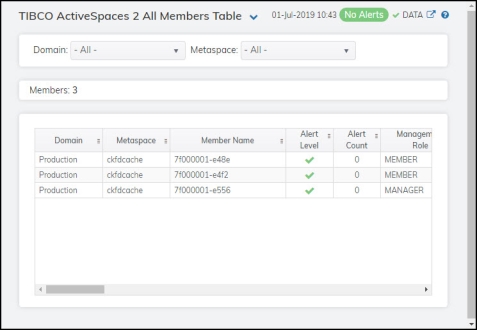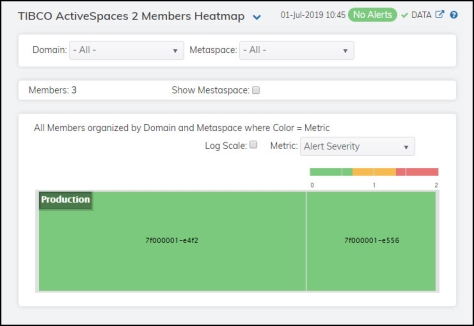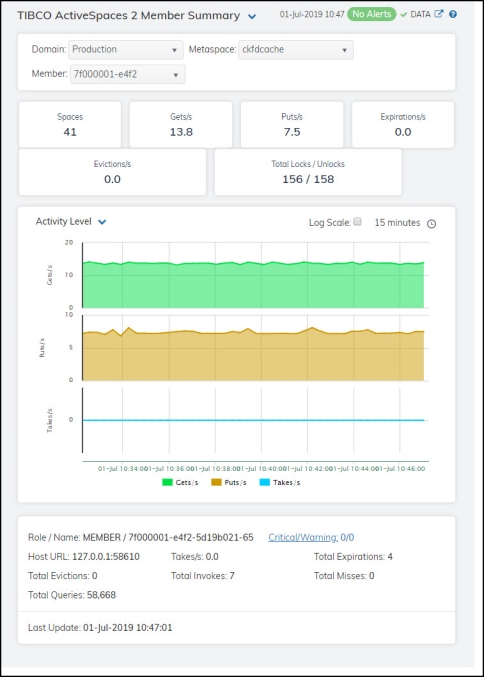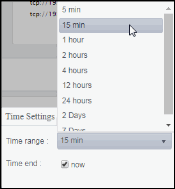Members
These displays present performance metrics and alert status for your TIBCO ActiveSpaces 2 spaces. Clicking Members from the left/navigation menu opens the TIBCO ActiveSpaces 2 All Members Table display, which shows a tabular view of all members in a particular metaspace. The options available under Members are:
| • | All Members Heatmap: Opens the TIBCO ActiveSpaces 2 Members Heatmap , which shows a heatmap view of all members in a particular metaspace. |
| • | Single Member: Opens the TIBCO ActiveSpaces 2 Member Summary display, which allows you to view current and trending data for a single member for a particular metaspace. |
TIBCO ActiveSpaces 2 All Members Table
The table in this display provides a view of all of the members in a particular metaspace and their associated metric data including domain, metaspace, alert severity, alert count, and the current value of each gathered metric. You can click a column header to sort column data in numerical or alphabetical order, and drill-down and investigate by double-clicking a row to view details for the selected member in the TIBCO ActiveSpaces 2 Member Summary display.

Note: Fields/columns with an asterisk (*) at the end of the field/column definition contain data that is provided by the selected domain. Refer to TIBCO ActiveSpaces documentation for more information regarding these fields.
|
Filter By: |
||||
|
|
Domain |
Select the domain for which you want to view data. |
||
|
|
Metaspace |
Select the metaspace for which you want to view data. |
||
|
Members |
The resulting total number of members found in the filtered query, and listed in the Members table. |
|||
|
Table |
||||
|
|
Domain |
The name of the domain. |
||
|
|
Metaspace |
The name of the metaspace. |
||
|
|
Member Name |
The name of the member. |
||
|
|
Alert Level |
The current alert severity.
|
||
|
|
Alert Count |
The total number of alerts for the host. |
||
|
|
Management Role |
The member’s role within the metaspace. |
||
|
|
Host Address |
The IP address of the host.* |
||
|
|
Host Port |
The port of the host.* |
||
|
|
PID |
The process ID of the process being monitored.* |
||
|
|
Process Name |
The name of the process.* |
||
|
|
Spaces |
The number of spaces in which the metaspace member is a member.* |
||
|
|
Total Entries |
The number of entries associated with the member.* |
||
|
|
Total Replicas |
The number of replicas.* |
||
|
|
Total Gets |
The total number of “get” operations performed on the user-spaces defined on the metaspace.* |
||
|
|
Current Gets |
The number of “get” operations performed on the user-spaces defined for the metaspace during the current polling interval.* |
||
|
|
Gets/s |
The rate of “get” operations (per second) performed on the user-spaces defined for the metaspace.* |
||
|
|
Total Puts |
The total number of “put” operations performed on the user-spaces defined on the metaspace.* |
||
|
|
Current Puts |
The number of “put” operations performed on the user-spaces defined for the metaspace during the current polling interval.* |
||
|
|
Puts/s |
The rate of “put” operations (per second) performed on the user-spaces defined for the metaspace.* |
||
|
|
Total Takes |
The total number of “take” operations performed on the user-spaces defined on the metaspace.* |
||
|
|
Current Takes |
The number of “take” operations performed on the user-spaces defined for the metaspace during the current polling interval.* |
||
|
|
Takes/s |
The rate of “take” operations (per second) performed on the user-spaces defined for the metaspace.* |
||
|
|
Total Expirations |
The total number of entries in the user-spaces defined on the metaspace that have expired.* |
||
|
|
Current Expirations |
The number of entries performed in the user-spaces defined for the metaspace that expired during the current polling interval.* |
||
|
|
Expirations/s |
The rate of entries in the user-spaces defined for the metaspace that expired (per second).* |
||
|
|
Total Evictions |
The total number of entries in the user-spaces defined on the metaspace that have been evicted.* |
||
|
|
Current Evictions |
The number of entries performed in the user-spaces defined for the metaspace that were evicted during the current polling interval.* |
||
|
|
Evictions/s |
The rate of entries in the user-spaces defined for the metaspace that were evicted (per second).* |
||
|
|
Total Locks |
The total number of locks in the user-spaces defined for the metaspace.* |
||
|
|
Total Unlocks |
The total number of unlocks in the user-spaces defined for the metaspace.* |
||
|
|
Total Invokes |
The remote invocation count.* |
||
|
|
Total Queries |
The total number of queries in the user-spaces defined for the metaspace.* |
||
|
|
Total Misses |
The total number of misses in the user-spaces defined for the metaspace.* |
||
|
|
To Persist |
The ToPersist count, which indicates how many tuples are required to be persisted to the database if the write-behind feature is configured.* |
||
|
|
Join Time |
The time that the member joined the space. |
||
|
|
Expired |
When checked, performance data has not been received within the time specified (in seconds) in the Expire Time field in the Duration region in the RTView Configuration Application > (Project Name) > Solution Package Configuration > TIBCO Active Spaces > DATA STORAGE tab. The Delete Time field (also in the Duration region) allows you to define the amount of time (in seconds) in which the row will be removed from the table if there is no response. |
||
|
|
Time Stamp |
The date and time the row data was last updated. |
||
TIBCO ActiveSpaces 2 Members Heatmap
Clicking All Members Heatmap in the left/navigation menu opens the TIBCO ActiveSpaces 2 Members Heatmap, which provides an easy-to-view interface that allows you to quickly identify the current status of each of your members for each available metric. Use the Metric drop-down menu to view the heatmap using a different metric.
The heatmap is organized so that each rectangle represents a member. The rectangle color indicates the most critical alert state. Click on a node to drill-down to the TIBCO ActiveSpaces 2 Member Summary display and view metrics for a particular member. Toggle between the commonly accessed displays by clicking the drop down list on the display title. You can use the Show Metaspace check-box to include or exclude labels in the heatmap, and you can mouse over a rectangle to see additional metrics for a particular member.

|
Filter By: |
|
|
|
|
|
|
Domain |
Select the Domain for which you want to view data. |
||
|
|
Metaspace |
Select the metaspace for which you want to view data. |
||
|
Members |
The number of members found for the selected Domain/Metaspace combination. |
|||
|
Show Metaspace |
Select this check box to display the names of the metaspaces at the top of each rectangle in the heatmap. |
|||
|
Heatmap |
||||
|
|
Log Scale |
Select this check box to use a logarithmic scale, rather than a linear scale, to map from the selected metric value for a cell to the color for the cell. Log Scale provides another way to distribute and differentiate values that you might not be able to see on a linear scale due to the dominant nature of large values in a linear scale. |
||
|
|
Metric |
Select the metric driving the heatmap display. The default is Alert Severity. Each Metric has a color gradient bar that maps values to colors. The heatmap is organized by members, where each rectangle represents a member. Mouse-over any rectangle to display the current values of the metrics for the member. Click on a rectangle to drill-down to the associated TIBCO ActiveSpaces 2 Member Summary display for a detailed view of metrics for that particular member. |
||
|
|
|
Alert Severity |
The current alert severity. Values range from 0 - 2, as indicated in the color gradient
|
|
|
|
|
Alert Count |
The total number of critical and warning alerts in the heatmap rectangle. The color gradient |
|
|
|
|
Entries |
The total number of entries for the member. The color gradient |
|
|
|
|
Gets/sec |
The number of gets per second. The color gradient |
|
|
|
|
Puts/sec |
The number of puts per second. The color gradient bar |
|
|
|
|
Takes/sec |
The number of takes per second. The color gradient |
|
|
|
|
Expires/sec |
The number of expires per second. The color gradient bar |
|
|
|
|
Evicts/sec |
The number of evictions per second. The color gradient |
|
|
|
|
CPU % |
The percentage of CPU used. The color gradient bar |
|
|
|
|
Memory % |
The percentage of memory used. The color gradient |
|
|
|
|
JVM Memory % |
The percentage of JVM memory used. The color gradient |
|
TIBCO ActiveSpaces 2 Member Summary
Clicking Single Member in the left/navigation menu opens the TIBCO ActiveSpaces 2 Member Summary display, which allows you to view of the current and historical metrics for a single member. Clicking on the information boxes at the top of the display takes you to the TIBCO ActiveSpaces 2 All Members Table display, where you can view additional member data. There are two options in the trend graph region: Activity Level and Exceptions. In the Activity Level trend graph region, you can view “gets” rate, “puts” rate, and “takes” rate over a selected time range. In the Exceptions trend graph region, you can view “expirations” rate and “evictions” rate over a selected time range. Clicking the Critical/Warning link at the bottom of the display opens the Alerts Table by Component display.

Note: Fields/columns with an asterisk (*) at the end of the field/column definition contain data that is provided by the selected domain. Refer to TIBCO ActiveSpaces documentation for more information regarding these fields.
|
Filter By: The display might include these filtering options: |
||||
|
|
Domain |
Select the domain for which you want to show data in the display. |
||
|
|
Metaspace |
Select the metaspace for which you want to show data in the display. |
||
|
|
Member |
Select the space for which you want to show data in the display. |
||
|
Fields and Data: |
||||
|
|
Spaces |
The total number of spaces in which the member is a member.* |
||
|
|
Gets/s |
The rate of “get” operations (per second) performed on the user-spaces defined for the metaspace.* |
||
|
|
Puts/s |
The rate of “put” operations (per second) performed on the user-spaces defined for the metaspace.* |
||
|
|
Expirations/s |
The rate of entries in the user-spaces defined for the metaspace that expired (per second).* |
||
|
|
Evictions/s |
The rate of entries in the user-spaces defined for the metaspace that were evicted (per second).* |
||
|
|
Total Locks/Unlocks |
The total number of locks and unlocks in the user-spaces defined for the metaspace.* |
||
|
Trend Graphs |
Activity Level Gets/s -- traces the number of gets per second. Puts/s-- traces the number of puts per second. Takes/s -- traces the number of takes per second. Exceptions Expirations/s -- traces the total number of expires, or the number of expires per second with Use Rates selected. Evictions/s -- traces the total number of evicts, or the number of evicts per second with Use Rates selected. |
|||
|
|
|
Log Scale |
Select to enable a logarithmic scale. Use Log Scale to see usage correlations for data with a wide range of values. For example, if a minority of your data is on a scale of tens, and a majority of your data is on a scale of thousands, the minority of your data is typically not visible in non-log scale graphs. Log Scale makes data on both scales visible by applying logarithmic values rather than actual values to the data. |
|
|
|
|
Time Settings |
Select a time range from the drop down menu varying from 5 Minutes to Last 7 Days. By default, the time range end point is the current time.
To change the time range, deselect the now toggle, which displays some additional date fields. You can click the left and right arrow buttons to decrease the end time by one time period (the time selected in the Time range drop down) per click, or you can choose the date and time from the associated calendar and clock icons. You can also enter the date and time in the text field using the following format: MMM dd, YYYY HH:MM:ss. For example, Aug 21, 2018 12:24 PM. Click the now toggle to reset the time range end point to the current time.
|
|
|
Role/Name |
The role of the member and the name of the member. |
|||
|
Host URL |
The IP address of the host. |
|||
|
Total Evictions |
The total number of entries in the user-spaces defined on the metaspace that have been evicted.* |
|||
|
Total Queries |
The total number of queries in the user-spaces defined for the metaspace.* |
|||
|
Critical/Warning |
The number of critical and warning alerts. |
|||
|
Takes/s |
The rate of “take” operations (per second) performed on the user-spaces defined for the metaspace.* |
|||
|
Total Invokes |
The remote invocation count.* |
|||
|
Total Expirations |
The total number of entries in the user-spaces defined on the metaspace that have expired.* |
|||
|
Total Misses |
The total number of misses in the user-spaces defined for the metaspace.* |
|||
|
Last Update |
The date and time in which the data in the display was last updated. |
|||

















